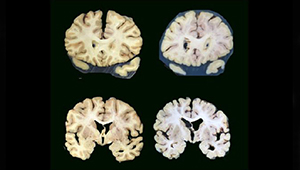Rod Walker, MS
Biography
Rod Walker, MS, has developed a diverse research portfolio in his 10+ years working as a biostatistician at KPWHRI. His varied interests have led to collaborations in women's health, cancer, aging and geriatrics, pharmacoepidemiology, opioids research, and mental health. During his tenure he has served as an analyst for the Statistical Coordinating Center for the National Cancer Institute's Breast Cancer Surveillance Consortium, evaluated the impact of health system initiatives to reduce risk associated with chronic opioid therapy prescribing, and investigated potential associations between different medications classes and a wide range of outcomes such as pneumonia, fall-related injury, and dementia.
One of Mr. Walker’s longest-running collaborations is with the Adult Changes in Thought (ACT) study, an ongoing longitudinal cohort study seeking to bolster knowledge of risk factors related to dementia, Alzheimer's disease, and healthy aging. As this project and related studies have grown, he has contributed to analyses of associations between medication use and laboratory values and cognitive outcomes within this cohort of older adults, extended this research to associations with neuropathology measures among autopsied individuals, and helped process and analyze activity monitoring data generated from devices worn by ACT participants. Continued collaboration with ACT-related investigators is a highlight of his research at KPWHRI, as the ACT study provides many avenues for increasing public health knowledge of issues relevant for older adults.
A relatively new area of collaboration for Mr. Walker is with researchers from the Mental Health Research Network seeking to use information captured in electronic health records to predict risk of suicide attempt and suicide death. He has appreciated learning from other investigators and biostatisticians on this project, expanding his knowledge in machine learning and risk prediction, as well as in potential issues surrounding health informatics and implementation of tools into clinical workflows. He looks forward to continued opportunities within this research area to address important public health issues in mental and behavioral health.
Research interests and experience
-
Biostatistics
Survival and longitudinal data analysis; epidemiology; machine learning; two-phase sampling
-
Aging & Geriatrics
Biostatistics; cognitive health and dementia; neuropathologic correlates of dementia; factors associated with healthy aging
-
Mental Health
Biostatistics; suicide risk prediction; interventions for risk reduction; machine learning and health informatics
-
Medication Use & Patient Safety
Biostatistics; pharmacoepidemiology; medication safety in older adults; opioids and chronic pain
-
Health Informatics
-
Women's Health
Recent publications
Lee CS, Su YR, Walker RL, Krakauer C, Blazes M, Johnson EA, Cronkite D, Bowers W, Hess C, Arterburn D, Agrón E, Chew EY, Crane PK A Novel AMD Severity Scoring System Leveraging the AREDS Studies and Routine Clinical Electronic Medical Records 2025 Oct;132(10):1076-1087. doi: 10.1016/j.ophtha.2025.04.026. Epub 2025-04-29. PubMed
Greenwood-Hickman MA, Walker RL, Idu AE, Bellettiere J, Wing D, McCurry SM, Crane PK, Larson EB, Rosenberg DE, LaCroix AZ Current and historic patterns of chronic disease burden are associated with physical activity and sedentary behavior in older adults: an observational study 2025 Mar 17;25(1):1032. doi: 10.1186/s12889-025-22264-8. Epub 2025-03-17. PubMed
Harrington LB, Powers JD, Bayliss EA, Fortmann SP, Shortreed SM, Walker RL, Floyd JS, Kuntz J, Fuller S, Alberston-Junkans L, Lee MH, Temposky LA, Dublin S Current use of estrogen-containing oral contraceptives or hormone therapy and risk of COVID-19 infection and hospitalization: a population-based cohort study 2024 Oct 7;193(10):1417-1425. doi: 10.1093/aje/kwae066. Epub 2024-05-16. PubMed
Lee CS, Ferguson AN, Gibbons LE, Walker R, Su YR, Krakauer C, Brush M, Kam J, Larson EB, Arterburn DE, Crane PK, Eye ACT Study Group: Eye Adult Changes in Thought (Eye ACT) Study: Design and Report on the Inaugural Cohort 2024 Jan;100(1):309-320. doi: 10.3233/JAD-240203. PubMed
Rasouli B, Chubak J, Floyd JS, Psaty BM, Nguyen M, Walker RL, Wiggins KL, Logan RW, Danaei G Combining high quality data with rigorous methods: emulation of a target trial using electronic health records and a nested case-control design 2023 Dec 28;383:e072346. doi: 10.1136/bmj-2022-072346. Epub 2023-12-28. PubMed
Research

COVID risks not meaningfully greater with estrogen-containing medications
Oral contraceptives, hormone therapy not linked to more severe COVID outcomes.
Research

Traumatic brain injury raises risk of brain atrophy
Study suggests pathology of brain cell loss after traumatic head injury is distinct from Alzheimer’s disease.
New findings

Simpler models to identify suicide risk perform similarly to more complex ones
Models that are easier to explain, use could have better uptake in health care settings.



